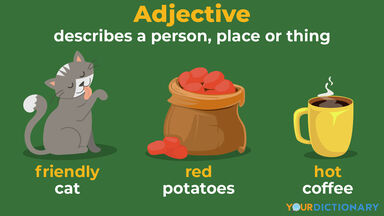What is an Adjective? definition
Adjectives are words that describe or alter the meaning of a noun or pronoun in a sentence.

Adjectives do not modify verbs, adverbs, or other adjectives in a sentence. Which one? How many? How much? What type of? How does it look? All of these questions are answered with the help of an appropriate adjective.
These are used to provide relevant information about a noun/pronoun in terms of size, shape, type, color, quality, duration. etc. These are used the most among other parts of speech in a sentence. Moreover, it enhances sentences by clarifying their meaning.
Types of adjective
There is various type of Adjectives based on their uses:
- Descriptive/ Qualitative type
- Quantitative type
- Proper type
- Demonstrative type
- Possessive type
- Interrogative type
- Indefinite type
- Articles as Adjectives
- Compound type
- Coordinate type
- Distributive type
- Predicate type
Descriptive type
Descriptive types are the most common type of Adjectives and describe nouns and pronouns. These provide noun or pronoun information to describe their attributes or qualities. These are also called Qualitative Adjectives.
When Descriptive adjectives are used to modify a noun, Participles such as –ing, -ed, -es, etc., are also used in the sentence.
Examples:
- Adorable puppy
- Exciting trip
- Angry customers
- Evil brother
- Annoying sibling
Quantitative type
These are used to give details about the quantity of the nouns/ pronouns in the sentence.
Quantity is described via answers to questions such as how much? Or How many?
Examples:
- I have two children.
- I have a couple of friends.
- He makes $10 an hour.
- She has four pets; one of them is a raccoon.
- I want to complete the whole assignment today.
Proper type
Proper types are the derived forms of proper nouns. Proper nouns become Proper Adjectives when they describe other nouns/ pronouns. These are always capitalized.
These can be used to describe a concept in just one word.
Examples:
- I love Indian food.
- That house has Egyptian interiors.
- He is British, and his wife is American.
Demonstrative type
An adjective demonstrative refers to something or someone that describes their position in space or time. The most popular demonstrative example include:
- this
- that
- these
- those
Example
- Those days were hard for him.
- That huge, fierce animal looks hungry.
Possessive type
Essentially, a possessive type describes who owns or has possession of a noun. These include:
- my
- your
- her
- his
- its
- our
For example:
- He went to my house.
- Lions stalk their prey.
Interrogative type
These serve as modifiers of words by asking questions about them. Moreover, a questionnaire adjective is also known as a questionative determiner. The interrogative type includes:
- what,
- which
- whose
For example:
- Which pen will you give me?
- What fruit would you like?
Indefinite type
When describing a noun in a non-specific sense, an indefinite type is used.
- any
- each
- few
- many
- much
- most
- several
- some
For example:
- I have seen some pens in the office
- How many times do you pray?
Articles as Adjectives
Fact time; all of the articles are adjectives:
- a
- an
- the.
The indefinite articles a and an are used to refer to non-specific things or persons.
For example:
- I’d like to have a glass of water
- An elephant
Compound type
An adjective that is composed of two or more adjectives is called a compound adjective.
For example:
- boyfriend
- bus-stop,
- dining-table
- greenhouse
Coordinate type
When a series of coordinate adjectives modify the same noun, they are separated with commas or by the word and.
For example:
- Chimpu is a cheerful, spirited, and cute Elephant.
Distributive type
In simplest terms, a distributive adjective is an adjective that describes members of a group separately. These are:
- Each
- Every
For example:
- Every child acquired a book.
- Each student got their own lunch box.
Predicate type
A predicate adjective describes the subject of an expression and is linked to the expression by a linking verb.
For example:
- Sourav’s sports car is Spanish.
- The music is soothing.
Stay tuned with Laws Of Nature for more useful grammar articles.
